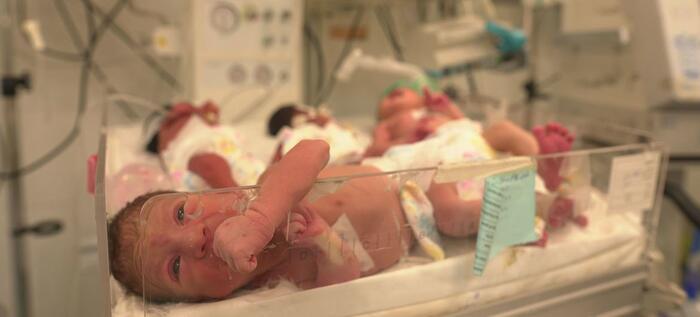No communication, limited medical supplies, and dwindling optimism encapsulate the challenges faced by hospital operations in the war-torn Gaza Strip, as described by a group of physicians who have been stranded inside the besieged Al Amal Hospital in Khan Younis for weeks.
Dr. Haidar Al-Qudra, the hospital manager, expressed the harsh reality, stating, “Life here is incredibly challenging,” in an interview with UN News.
Presently, only 12 out of Gaza’s 36 medical facilities are operational to some extent, as reported by the World Health Organization (), with the remaining hospitals devastated due to the continuous airstrikes by Israel on the enclave.
As the conflict in Gaza extends into its fifth month, Israeli military actions persist in targeting healthcare institutions, with Al Amal Hospital being the recent victim of a prolonged and deadly siege. While Israel alleges that Hamas is using hospitals as bases, Palestinian authorities and healthcare professionals have refuted these claims.
Al Amal Hospital endured 40 direct hits resulting in the loss of at least 25 lives and rendering the facility inoperable, according to information from the UN Humanitarian Country Team in Palestine.
The structures continue to be under fire from Israeli snipers, facing communication breakdowns, detainment of medical personnel, severe shortages of essential supplies, and restrictions on the entry of life-saving resources into the compound, as reported by UN agencies and news outlets.
‘We are now encircled’
Since the onset of the siege on Al Amal in January, over 8,000 displaced individuals have been evacuated from the premises, seeking refuge from Israeli assaults in the vicinity.
The ongoing nearby conflicts and repeated bombings have instilled fear among healthcare workers, confining them to the hospital premises for over a month, unable to venture outside the buildings, as Dr. Al-Qudra highlighted. He mentioned, “We are now encircled, and patients are unable to access the hospital due to restrictions on movement in the surrounding streets. Our ambulances are paralyzed within the hospital grounds.”

‘Majority of patients have perished or are enduring immense suffering’
Numerous surgical procedures have been postponed, leading to a significant backlog of cases, including mastectomies and thyroidectomies, over the past five months.
Dr. Al-Qudra lamented, “The absence of these routine surgeries across all hospitals has resulted in the death of many patients or exacerbated their suffering.”
The extensive damage has compelled the hospital management to arrange the transfer of approximately 35 patients to nearby medical facilities following the collapse of the third-floor ceiling.
However, the remaining hospitals in Gaza are grappling with severe overcrowding issues, as seen in Rafah, where 77 newborns are sharing a mere 20 incubators, according to reports.
‘Witnessing daylight for the first time’
Dr. Waheed Qudih, a surgical consultant at Al Amal Hospital, recounted the ordeal of being trapped inside the hospital during the siege.
He expressed relief at the arrival of a joint UN mission at the beleaguered premises this week, stating, “This is the first time we are seeing daylight since January 21st. We have been confined within the hospital premises, solely focusing on attending to the injured patients.”
Dr. Qudih, along with his colleagues, remained on-site to provide medical assistance to the wounded, conducting numerous surgeries despite the limited resources available. He emphasized, “We have saved numerous lives and offered the best care possible under the circumstances.”
Joint UN humanitarian intervention
In response to the reports of the besieged hospital, the UN swiftly mobilized a team comprising WHO, humanitarian affairs agencies, UNMAS, UNFPA, UNDSS, and UNRWA, to assess the situation.
The mission aimed to evacuate 24 patients, deliver essential supplies including food, water, fuel, emergency surgical equipment, and antibiotics to treat infections for an estimated 50 individuals.
Regrettably, due to unforeseen circumstances, 31 non-critical patients had to be left behind, as detailed by an OCHA spokesperson, citing the lack of communication from the Israeli military, which led to delays and challenges faced by the mission.
‘Patients still in need of urgent care’
Dr. Athanasios Gargavannis, a trauma surgeon and WHO emergency responder, expressed shock at the level of devastation witnessed at the hospital, describing it as unimaginable.
He emphasized, “Despite the widespread destruction, there are patients here who require immediate attention. Our primary focus is to identify and refer these individuals to ensure they receive the necessary care.”
As delays persist at the Kerem Shalom crossing, hindering the entry of aid into Gaza, some nations have resorted to emergency airdrops to provide assistance. However, these efforts only address a fraction of the urgent requirements at Al Amal Hospital and other medical centers in Gaza.
‘Disregard for humanitarian principles’
Dr. Al-Qudra highlighted the pre-war capacity of Al Amal Hospital, which catered to maternal and child health, basic surgical procedures, internal medicine, and specialized rehabilitation services with 100 beds. However, the recent bombings have reduced the capacity to an estimated 60 beds, exacerbating the scarcity of supplies and ongoing communication challenges.
The Palestinian Red Crescent Society reported that seven of its members, including medical personnel, were detained by Israeli forces for nearly three weeks, following the raid on Al Amal Hospital, underscoring the lack of respect for humanitarian laws concerning medical staff in Gaza.
In the current dire circumstances in Gaza, Dr. Al-Qudra emphasized the blatant disregard for established rules and humanitarian norms governing the treatment of medical personnel.
